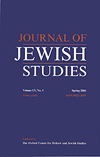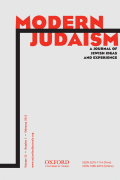
Jewish Historical Studies-Transactions of the Jewish Historical Society of England
Scope & Guideline
Connecting Past and Present: A Journey Through Jewish History
Introduction
Aims and Scopes
- Jewish Community Histories:
The journal consistently examines the histories of Jewish communities, particularly in the UK and South Africa, highlighting their development, challenges, and contributions to broader societal contexts. - Antisemitism and Racism:
A significant portion of the journal's articles address the themes of antisemitism and its intersections with broader racial discourses, particularly in modern contexts such as South Africa. - Cultural Contributions:
The journal explores Jewish cultural expressions, including literature, music, and culinary traditions, emphasizing their role in shaping Jewish identity and community life. - Reflections on Historical Methodology:
There is a focus on the methodologies of writing Jewish history, encouraging reflective practices that consider the ties between history and contemporary issues. - Holocaust Studies:
The journal includes a substantial body of work dedicated to Holocaust studies, examining memory, representation, and the impact of the Holocaust on Jewish identity and historiography.
Trending and Emerging
- Intersectionality of Antisemitism and Other Social Issues:
There is a growing trend to explore the intersections of antisemitism with other forms of discrimination, particularly in the context of South Africa, indicating a broader social awareness among scholars. - Community and Identity Formation:
Emerging themes focus on how Jewish communities construct their identities through various cultural practices, such as cookbooks and memorialization efforts, reflecting a dynamic engagement with identity politics. - Reflections on Historical Figures and Events:
Recent articles increasingly reflect on influential historical figures and specific events, suggesting a trend towards biographical and event-centric studies that personalize the historical narrative. - Engagement with Contemporary Issues:
There is a noticeable increase in discussions that connect historical narratives with contemporary societal issues, such as the politics of space and identity, indicating a desire to make history relevant to present-day challenges.
Declining or Waning
- Traditional Religious Practices:
There appears to be a waning focus on traditional religious practices and their historical significance, as more articles shift towards contemporary social issues and identities. - General Jewish History:
Broad surveys of Jewish history without a specific focus are becoming less common, with a noticeable preference for case studies that emphasize particular communities or themes. - Jewish Diaspora Studies:
The exploration of the Jewish diaspora, particularly outside the UK and South Africa, seems to be receiving less attention, possibly overshadowed by localized studies.
Similar Journals

Kwartalnik Historii Zydow-Jewish History Quarterly
Illuminating Jewish Narratives Through TimeKwartalnik Historii Żydów - Jewish History Quarterly is a dedicated academic journal published by the esteemed Jewish Historical Institute in Warsaw, Poland. With an ISSN of 1899-3044, this quarterly publication serves as a vital platform for scholarly discourse on Jewish history, culture, and heritage. The journal aims to reflect the diversity and complexity of Jewish experiences across historical contexts, making it an essential resource for researchers, professionals, and students in the fields of History, Religious Studies, and Cultural Studies. Despite its recent coverage discontinuation in Scopus from 2012 to 2015, the journal's rankings within its respective categories indicate a modestly engaged readership and potential for contribution, particularly seen in its ranks of 339/388 in Religious Studies and 859/975 in History. Although the journal operates on a non-open access basis, its curated articles enrich the understanding of Jewish narratives and interactions within broader socio-cultural frameworks, underlining its importance in promoting historical knowledge and cultural appreciation.

JOURNAL OF JEWISH STUDIES
Exploring the Depths of Jewish HeritageJOURNAL OF JEWISH STUDIES, published by the Oxford Centre for Hebrew and Jewish Studies, stands as a distinguished platform for scholarly discourse in the fields of Jewish history, culture, literature, and religious studies. With its ISSN 0022-2097, this journal is recognized for its significant contributions to understanding Jewish heritage and thought, achieving commendable rankings in various categories, including Q1 in Literature and Literary Theory and Q2 in History and Cultural Studies, as of 2023. The journal fosters rigorous academic engagement and encourages researchers and scholars worldwide to explore the complexities of Jewish identity and its interconnections with broader historical narratives. Operating without an open access model, it nonetheless ensures a wide reach through its well-regarded reputation, making it an essential resource for anyone invested in Jewish studies. With a publication history spanning from 2002 to 2024, the journal continues to serve as an invaluable repository of knowledge and insight for students, researchers, and professionals alike.

MODERN JUDAISM
Fostering Scholarly Dialogue on Contemporary JudaismMODERN JUDAISM is a premier journal dedicated to the multifaceted exploration of Jewish culture, history, and religious practice, providing a significant platform for scholarly discourse since its inception in 1981. Published by Oxford University Press Inc in the United States, this journal stands out with its diverse engagement across disciplines, reflected in its commendable 2023 category quartiles: Q2 in Cultural Studies and History, Q1 in Religious Studies, and notable rankings in Political Science and Sociology. With an impact factor that underscores its rigorous peer-review process and scholarly relevance, MODERN JUDAISM serves as an essential resource for researchers, professionals, and students alike, fostering an academic environment conducive to innovative ideas and comprehensive studies. Although not open access, the journal remains crucial for anyone looking to deepen their understanding of contemporary Jewish thought and its intersection with broader cultural and political currents. For further inquiry or submissions, please refer to the Journals Department at 2001 Evans Rd, Cary, NC 27513.

JEWISH SOCIAL STUDIES
Cultivating rigorous research in the humanities of Jewish Studies.Jewish Social Studies is a prominent peer-reviewed journal published by Indiana University Press, dedicated to advancing the field of Jewish scholarship through interdisciplinary exploration and critical inquiry. With an ISSN of 0021-6704 and an E-ISSN of 1527-2028, this journal has become a vital resource for researchers and scholars, achieving Q2 rankings in both History and Religious Studies, as well as strong standings in Anthropology and Cultural Studies. The journal bridges the gaps between diverse academic disciplines, focusing on the multifaceted dimensions of Jewish life, culture, and history, making it essential reading for anyone engaged in the study of Judaism. Although it does not currently offer Open Access options, the journal promotes a wealth of rigorous research, critical perspectives, and in-depth analyses that contribute significantly to the understanding of Jewish Studies from 1975 to the present day, with ongoing issues scheduled until 2024. With an established audience of scholars, professionals, and students, Jewish Social Studies remains a leading platform for intellectual discourse and scholarly exchange in the humanities.

Journal for the Study of Judaism
Exploring the Rich Tapestry of Jewish ThoughtJournal for the Study of Judaism, published by BRILL, serves as a vital platform for scholarly discourse in the fields of History, Literature and Literary Theory, and Religious Studies. With a commendable impact factor and ranking in the Q2 and Q3 quartiles across its respective categories, this journal facilitates high-quality research that explores the multi-faceted dimensions of Jewish studies from its inception in 1970 to the present day. For those who engage with the journal, the commitment to rigorous peer-review processes ensures publication of significant articles that advance knowledge and foster discussions within the academic community. As an essential resource for researchers, professionals, and students alike, the journal continues to enrich the understanding of Judaism through esteemed contributions of scholarship and critical analysis. The journal’s rich legacy and commitment to excellence make it an indispensable tool for those seeking to deepen their insight into Jewish studies and its broader implications.

Judaica Bohemiae
Exploring the Rich Tapestry of Jewish Heritage in Central EuropeJudaica Bohemiae, published by the Zidovske Muzeum Praze, is a prominent scholarly journal dedicated to the study of Jewish culture, history, and religious practices, with a particular focus on the Czech Republic and Central Europe. Since its relaunch in 2007, the journal has established itself as a valuable resource in the fields of Cultural Studies, History, and Religious Studies, achieving a commendable Q2 ranking across these disciplines in 2023. With its thoughtful compilation of research articles and critical essays, Judaica Bohemiae offers insights into the evolving dynamics of Jewish existence and identity. Although it does not currently operate under an open access model, the journal ensures that its high-quality content remains accessible to researchers, professionals, and students interested in the nuanced intersections of culture and history. By promoting rigorous academic discourse and advancing the understanding of Jewish heritage, Judaica Bohemiae continues to play a crucial role in its field, fostering scholarly connections and illuminating the past for future generations.

Nordisk Judaistik-Scandinavian Jewish Studies
Connecting Tradition and Modernity in Jewish StudiesNordisk Judaistik-Scandinavian Jewish Studies is a distinguished academic journal dedicated to the exploration of Jewish culture, history, and religious practices in the Scandinavian context. Published by the DONNER INSTITUTE FOR RESEARCH ON RELIGIOUS AND CULTURAL HISTORY in Finland, this journal has been an open access platform since 2016, allowing easy dissemination of knowledge and fostering scholarly communication among researchers, educators, and students. With a variety of subjects encompassing Anthropology, Cultural Studies, History, and Religious Studies, the journal has achieved commendable recognition, with its latest rankings placing it in Q2 in several categories according to the 2023 Scopus rankings. The journal's significant contribution to the field is evident through its impact, evidenced by its strategic position within its respective quartiles. By bridging interdisciplinary methodologies and Jewish studies within a Scandinavian framework, Nordisk Judaistik serves as an essential resource for those engaged in the complexities and nuances of Jewish heritage and identity in the region.

Tradition-A Journal of Orthodox Jewish Thought
Illuminating Tradition Through Scholarly DiscourseTradition: A Journal of Orthodox Jewish Thought is a prestigious academic journal published by the Rabbinical Council of America, dedicated to the exploration and analysis of Orthodox Jewish thought and its implications on contemporary issues. With a legacy dating back to 1973, this journal serves as a crucial platform for scholars, theologians, and students interested in the rich tapestry of Jewish philosophy, law, and ethics. Although it does not offer open access, its thoughtful, peer-reviewed articles are essential for advancing knowledge in Jewish academia and fostering dialogue within the broader cultural context. As an authoritative voice in the field, Tradition invites submissions that challenge, inform, and inspire further inquiry into the complexities of Jewish tradition, ensuring that it remains at the forefront of scholarly discussion.

Images
Decoding the Impact of Visuality on Cultural NarrativesImages, published by BRILL, serves as a significant academic platform within the realms of Cultural Studies, History, Religious Studies, and the Visual Arts and Performing Arts. With its ISSN 1871-7993 and E-ISSN 1871-8000, this journal is committed to providing a scholarly forum that engages with the complexities of visual representations and their impact on cultural narratives. Though it currently holds a Q4 category ranking across various fields, indicating room for growth, its presence in Scopus rankings showcases its contribution to the arts and humanities, positioning it as a unique voice in interdisciplinary discourse. The journal aims to publish innovative research that fosters dialogue among scholars, practitioners, and students interested in the intersections of visual culture and societal dynamics. Despite its non-open access status, Images remains a vital resource for those seeking to understand the intricate fabric of cultural expressions from historical and contemporary perspectives, offering insights that resonate across academic and artistic landscapes.

Jewish Studies Quarterly
Deepening Understanding of Jewish Cultures and PracticesJewish Studies Quarterly, published by MOHR SIEBECK, is a leading academic journal dedicated to advancing scholarship in the field of Jewish studies. With its ISSN 0944-5706 and E-ISSN 1868-6788, this journal provides a platform for rigorous research that explores various dimensions of Jewish history, culture, religious practices, and contemporary issues. Although it does not currently offer open access options, it remains an essential resource for researchers, professionals, and students seeking insightful analysis and academic discourse. The journal is widely recognized for its commitment to excellence and contribution to understanding Jewish identities within global contexts. Located in Tübingen, Germany, Jewish Studies Quarterly is integral to the dialogue and scholarship surrounding Jewish thought and heritage, making it a vital reference point in the academic community.